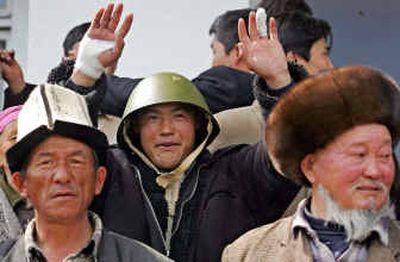Opposition takes key Kyrgyzstan city

OSH, Kyrgyzstan – Thousands of protesters, some armed with clubs and Molotov cocktails, overran Kyrgyzstan’s second-largest city Monday, forcing police to flee as the government lost control of the impoverished southern region of the former Soviet republic.
Demonstrators in Osh burned and stomped on portraits of President Askar Akayev and seized control of the airport. The army did not intervene despite the chaos. No casualties were reported.
The opposition occupied government buildings in five cities and towns across southern Kyrgyzstan, Interior Ministry spokesman Nurdin Jangarayev said. The capital, Bishkek, which is cut off from the south in winter by a high mountain range, remained calm, but the emboldened opposition vowed to press on until Akayev resigns.
“Power in Osh has been taken over by people!” opposition member Anvar Artykov told the crowd. “I congratulate you on our victory and urge you to maintain order.”
The protests, involving more than 17,000 people in the affected cities, won the first concession from Akayev – an investigation into allegations of widespread vote-rigging in two rounds of parliamentary elections since Feb. 27. The allegations, backed by European observers, have led to demands for Akayev’s resignation and to weeks of increasingly violent protests.
Although Central Asia is the last and largest bastion of post-Soviet dictators, Akayev was regarded as the region’s most reform-minded leader. But in recent years he has increasingly cracked down, and his reputation was tarnished in 2002 after police killed six demonstrators protesting the arrest of an opposition lawmaker.
Abdil Seghizbayev, an Akayev aide, said security forces would not act against the protesters and said peace talks would be possible only after order is restored.
“Neither the authorities nor opposition leaders can control the crowd right now,” he said. “If an (opposition) leader emerges who can control the protesters, the government will be ready to talk to him.”
The demonstrations make Kyrgyzstan the next possible candidate for a revolution within the former Soviet bloc. However, the uprisings that swept Georgia and Ukraine in the past two years were peaceful – and Kyrgyzstan lacks a powerful opposition leader able to take over.
Kyrgyzstan’s opposition parties long have been fractured along regional lines running parallel to the mountain range that divides the country. The south is poorer and densely populated, and its residents resent what they see as a lack of adequate representation, while the north, including Bishkek, enjoys most of the power and resources.
The opposition is convinced that it is being shut out of political life in this mostly Muslim nation of 5 million people. Although Islamic militants have conducted raids in Kyrgyzstan in previous years, religion does not appear to be playing a role in the latest protests.
Kyrgyzstan, which borders China, Uzbekistan, Tajikistan and Kazakhstan, is an energy-rich region of considerable interest to the United States and to Russia, which are vying for influence in the area.
Southern Kyrgyzstan has been the scene of a series of incursions in recent years linked to the Islamic Movement of Uzbekistan, a group that fought alongside the Taliban against the U.S.-backed government in Afghanistan. U.S. troops and other anti-terrorist coalition forces are based at the Manas airport near Bishkek for air operations in Afghanistan.
Russia condemned Monday’s protests, as it did last year with Ukraine.
“Extremist forces must not be allowed to use political instability to create a threat to the democratic foundations of Kyrgyz statehood,” the Russian Foreign Ministry said.
Moscow also rebuked the Organization for Security and Cooperation in Europe for its critical evaluation of the elections, urging it to “be more responsible in forming its conclusions to prevent destructive elements from using these assessments to justify their lawless actions.”
U.N. Secretary-General Kofi Annan urged both sides to settle the dispute peacefully, according to his spokesman.
“The secretary-general is opposed to the use of violence and intimidation to resolve electoral and political disputes, and calls on all parties to apply restraint,” Fred Eckhard said. “Dialogue is the only viable means for addressing the current tensions.”
The opposition has charged that Akayev, 60, who is prohibited from seeking another term, planned to manipulate the parliamentary vote to gain a compliant legislature that would amend the constitution to allow him a third term. Akayev, who has been president for 15 years, has denied wanting another term.
Roza Otunbayeva, an opposition leader and former foreign minister, on Monday ruled out any talks with Akayev.